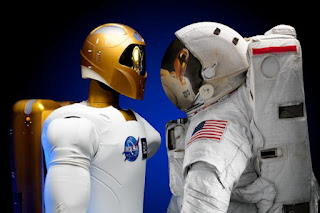Manned OR Unmanned space exploration?
Should we save money and lives by ending manned spaceflight or will machines never match the experience and inspiration of sending men and women into space?
If we look at the greatest discoveries and scientific research that have already been made in the solar system's exploration, the vast majority have been made by robot probes alone. The discovery of the great hydrocarbon lakes on Saturn's moon, Titan, and the discovery of the underground ocean on another of Saturn's moons, Enceladus, are good examples. Automated spacecraft cost far less and they’re getting more capable every year; and if they fail, nobody dies!
I therefore believe that unmanned space flights are a better alternative to manned missions. “It’s the robot probe that is capturing interest today.”
This issue needs to be looked at from two perspectives - science and that of human curiosity. From a science perspective if the confidence of a mission to a particular planet or celestial body is untested, safety being paramount, it will make sense to carry unmanned missions. It will also allow for longer missions because as we will go to far off galaxies to research, it will take several years to reach and no human being can be subjected to that extent of mental pressure or isolation in space. In addition to that, it will also allow missions to be continued for multi years on celestial bodies where conditions are not conducive for humans to survive. AI-helped exploration is easily deployable within time periods. Rovers have the capability to traverse the lunar or Martian surface for decades and in this time frame, they can continuously learn about the topography and seismographic activity on various planets. When it comes to making discoveries, sending men and women to space is expensive, and so relatively cheap robot probes are the future. We can have an unmanned mission relay its data to earth where through super computers or through advanced machine learning models, the data can be interpreted by human intelligence for patterns which a machine will not be able to decipher alone.
This sets the basis for one exception where human skills are to be needed. In places of sophistication where some inference or decision involving the future of our species, like deciding whether the Martian surface supports primitive life, needs to be taken, there has to be some kind of human involvement and leadership. This will act as an inspiration for everyone to be involved in dedicated research. On February 18, 2021, NASA successfully landed its Perseverance rover on the surface of Mars. The descent of Perseverance required highly complex landing systems. Due to the distance between the two planets, hand steering of the rover is not possible. NASA used AI to scan the landing site beforehand and hence landed safely. In the end, I would like to ask you one question - ‘If right now, in the 21st century we are able to use Artificial Intelligence to successfully maneuver the space world, can you imagine what all can be the scope for the future?’ The sophisticated tasks that are not in reach of robots today, will also be possible in the years to come.
Views expressed are personal
P.S. - A special thank you to Aanya Yaduvanshi for helping me in writing this article and sharing her valuable thoughts and suggestions.

Comments
Post a Comment